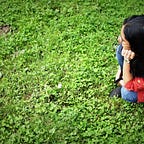Exams and Friends
The exams are over. The clang of the final bell brings a relief best expressed by running out of the classroom, extricating your bags from the heap, and rushing into the playground. There is no other place that screams abandon and joy.
At the end of every set of term exams, my friends and I gathered in the playground for a special lunch. Our mothers, well aware of our expectations, delivered their culinary best — each had her specialties packed into the steel tiffin boxes we opened with great anticipation. These were pre-sanitiser, pre-handwash days. We simply washed away ink stains and cramps from our fingers with water from our reused Kissan Fruit Kick bottles, sank hands freely into the boxes, and scooped up poori with chana or fried rice — hygiene lessons from Biology left behind in the classroom, where they belonged. Dessert usually came in the form of a bar or two of 5-Star chocolate divided among five girls. We didn’t have a posh school canteen or lavish pocket money; our parents bought us everything we needed and gave us little allowances to spend on friends for their birthdays. Birthday gifts, as we grew older, were usually pens or nail polish or little trinkets.
On the playground, chattering and laughing after the exams, we were ourselves. We made fun of one another and cherished that quarter of an hour before we had to run for the bus. These were times when we didn’t know what the grown-up world stood for, and we weren’t in much of a hurry to get there. But we did want to pass our exams and get to the next class, which is a bit at odds with not wanting to grow up too soon!
We weren’t alone, as stories had us know. Whether it came to celebrating the end of exams, or playing truant while preparing for them, we had company. Take R K Narayan’s Swami and Friends. Mani goes to the school peon with a bag of brinjals, innocently assuming that the man has access to the question papers. The peon, who clearly doesn’t have a clue, hems and haws and, if I remember correctly, asks Mani to prepare maps well. Swami, our hero, spends the eve of the exams “dreaming of going to Ameer Mart, jingling with coins, and buying things!” Ruled sheets, unruled sheets, nibs, ink, clips, a pad — the list is deliciously long until Swami’s father scores items off it with a thick red pencil, and packs the boy off to study. You can bet that Swami elected to gossip with his grandmother, instead.
Swami’s preparation (or lack of it) is tested in the exam hall, and there is a lovely description of his antics as he struggles with a question on the moral of a story, looking around himself for inspiration at boys writing furiously, or staring into the distance. The moral eludes him as he grapples with the philosophy inherent in the story and the plain outcome of an action, choosing to write about the latter in a single sentence. Sankar, the brains of the class, gives a detailed answer. When they compare notes after the exam, Swami feels a momentary pang of uncertainty, which he comfortably dismisses as he realises that the exams are over and runs out with the other boys to create a ruckus in the playground.
I was like Swami when it came to discussing answers after the exams. I clapped my ears shut and tucked my folded question paper into a textbook I wouldn’t have to see again soon. What was the point of ruminating over a thing done and dusted? (This is one piece of wisdom I wish I’d carried into adulthood.) Sure, I had moments of doubt in the middle of the night and occasionally scrambled for my book to check if I’d given the right answer, but I largely avoided the post-exam discussions. I stuck to this principle quite strongly. After an Intermediate Maths exam (which, at that point, was supposed to decide my future and my place in the universe and my career for this birth and all future ones), when my teacher asked me what my answer to a “tricky” problem was, I told him I didn’t want to discuss it — because what if I’d answered it wrong and lost one whole mark? Imagine the ignominy I’d be doomed to!
A little while later, my dad came home from work and asked, “So what was your answer to that iπ/2 problem?” — inadvertently revealing the solution: iπ/2. Such is my conditioning that I feel compelled to tell you that I got it right. And you also see where it comes from, if an exam question was office news. All our parents were all determined to make engineers out of us! However, that came later. The featured playground was the site of a lot of memories, games, and growth.
Back to the present: we have deadlines and meetings and Zoom calls, but more agency and power. I like to believe we do, and that my friends are all part of it. Things don’t always go our way, but we can at least try without fear of punishment or snark we can’t combat. There’s a long way to go, but if you’re creating a school syllabus, please remember to have fewer exams, more lessons on resilience, and plenty of time for fun and freedom. Make the coming generations happier and better adjusted to our messy world.
